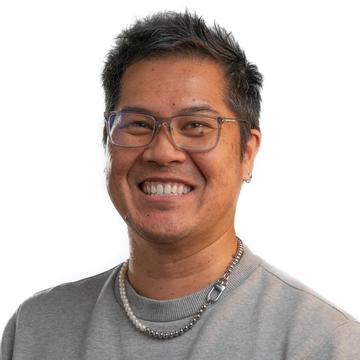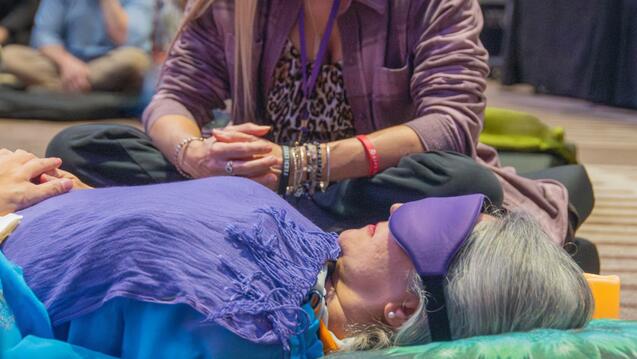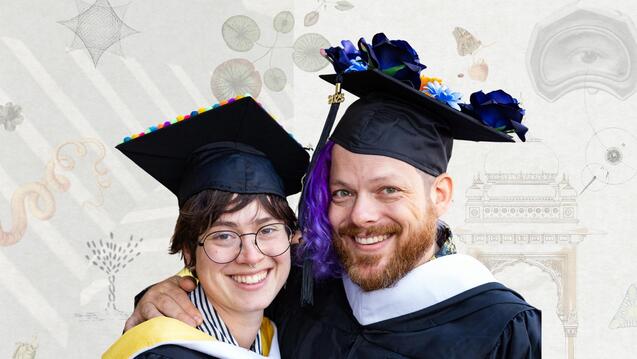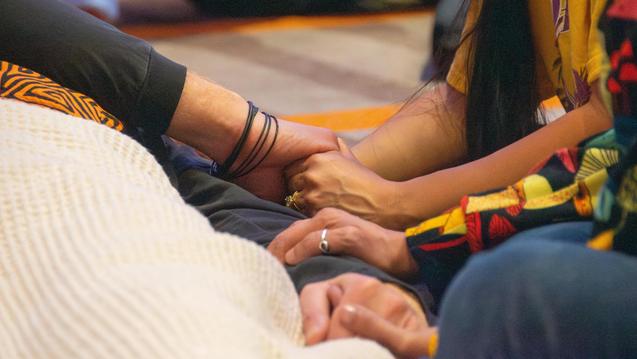A Free Online Info Session with Laura Pustarfi and Kelson Pamarang
Certificate in Psychedelic-Assisted Therapies and Research
Our 2026-2027 applications will open on January 15, 2026. The priority deadline is March 16, 2026.
Application fees are waived for applicants who submit before March 16th.
Program Overview
The Psychedelic-Assisted Therapies and Research Certificate offers rigorous, compassionate training for clinicians, therapists, researchers, clergy, and professionals in affiliated fields seeking to engage responsibly with psychedelic-assisted therapy.
The program educates on topics from contemporary research to spiritual, cultural, and traditional wisdom practices. You will join a community of trainees committed to learning about ethical care, personal growth, and collective healing.
You will gain:
- A comprehensive foundation in psychedelic-assisted therapeutic competencies
- Culturally informed approaches
- Mentorship with experienced clinicians, researchers, and facilitators
- A supportive learning community grounded in shared values and integrity
The certificate training is based on safety, integrity, and respect for the law. Our learning community is guided by the CIIS Beloved Community Agreements, emphasizing compassion, accountability, and inclusion.
All training is conducted in compliance with federal and state regulations. The program does not require or promote the use of illegal substances.
-
Consistent with the holistic ideals of CIIS, this certificate strives to encompass intellectual/didactic, personal/experiential, and applied aspects of learning. Learning processes are embedded in self-reflection, community-building, embodied ways of knowing, and mentoring. Trainees are introduced to a wide variety of skills and knowledge bases, including pharmacology of psychoactive substances, research design, psychedelic therapist and facilitator competencies, the global history of psychoactive plant use, and cultural competencies for working with clients. The program emphasizes clinical work with MDMA and psilocybin, with additional coursework on ketamine-assisted psychotherapy (FDA-approved for specific clinical syndromes).
The program thoroughly covers clinical work with MDMA and psilocybin with additional coursework on ketamine-assisted psychotherapy (FDA-approved for specific clinical syndromes). In order to accomplish such a holistic enterprise, the program values and implements the deconstruction of various perspectives and cultural viewpoints, along with didactic and experiential learning with teachers representing diverse specializations. The global wisdom traditions related to alterations of consciousness (meditation, yoga, fasting, solo wilderness retreats, healing methods, etc.) play a role in the theoretical underpinnings of the curriculum, as well as being directly enacted as part of the personal/experiential aspect of the training.
Many of our certificate graduates are leaders in the field. See our Alumni Publication Catalog, a booklet showcasing the impressive body of psychedelic peer-reviewed publications and books of scholarship and research written by graduates after they completed the certificate program. This collection of more than 135 journal articles and books highlights the depth and breadth of scholarship emerging from our distinguished alumni community and reflects their significant influential contributions to advancing the field of psychedelic therapies and research.
-
The program’s scope of inquiry introduces trainees to the field’s empirical research methods and outcomes, the key clinical competencies, and explores ways for graduates to situate themselves in the constantly evolving streams of non-profit and for-profit organizations, and decriminalization movements. Access to experts in the psychedelic field and group mentoring experiences enable graduates to create professional connections not otherwise available. Trainees participate in small groups among their peers in order to develop personal connections and build opportunities, and are welcomed to join an engaging, active Alumni Association.
It is important to note that at no time does the program promote or require the use of psychedelic drugs in any manner, in accordance with the CIIS Student Handbook and CIIS Academic Catalog policies, as well as state and federal law. Trainees taking the certificate will learn about the competencies required of therapists (licensed clinicians) and facilitators (unlicensed trained professionals) in federally approved medical treatment and psychedelic research, as well as key aspects of guidelines in decriminalized states and regions. Applicants who are offered admission will sign an Integrity Agreement and a Beloved Community Initiative Agreement. These agreements reflect our commitment to professional ethical and legal standards and a classroom environment that is safe and welcoming.
Format and Schedule
Our program unfolds over eight weekends and includes 140-150 hours of professional instruction and preparation. Classes are held from October to May each year in one of two cohort formats: Hybrid in San Francisco or Online.
The Hybrid Cohort in San Francisco will meet both online and in-person throughout the program over three 4-day in-person weekends and five virtual Saturday classes to provide a rhythm of immersive engagement, personal reflection, and applied learning.
The Online Cohort will participate at a distance over two 4-day weekends, one 2-day class meeting, and five Saturday classes. The Online Cohort meets on the hybrid Cohort schedule via video conference.
-
The dates are set, but times may be subject to change.
Dates Times Format Welcome Weekend
October 8-11, 2026Thursday
2:00pm – 7:00pm PTFriday and Saturday
9:00am – 7:00pm PTSunday
9:00am – 1:00pm PTIn-Person November 7, 2026 8:30am – 3:30pm PT Online December 5, 2026 8:30am – 3:30pm PT Online January 28-29, 2026
Includes Holotropic BreathworkThursday
2:00pm – 7:00pm PTFriday
9:00am – 7:00pm PTSunday
8:30am – 12:30pm PTIn-Person February 27, 2026 8:30am – 3:30pm PT Online March 27, 2026 8:30am – 3:30pm PT Online April 24, 2026 8:30am – 3:30pm PT Online Closing Weekend
May 20-23, 2026Thursday
2:00pm – 7:00pm PTFriday and Saturday
9:00am – 7:00pm PTSunday
8:30am – 1:00pm PTIn-Person -
The dates are set, but times may be subject to change.
Dates Times Format Welcome Weekend
October 8-11, 2026Thursday
2:00pm – 7:00pm PTFriday and Saturday
9:00am – 7:00pm PTSunday
9:00am – 1:00pm PTOnline November 7, 2026 8:30am – 3:30pm PT Online December 5, 2026 8:30am – 3:30pm PT Online January 28-29, 2026 Thursday
2:00pm – 7:00pm PTFriday
9:00am – 5:00pm PTOnline Optional Holotropic Breathwork ($600)
January 29 from 5pm PT through January 31 at 1pm PTIn-Person in SF February 27, 2026 8:30am – 3:30pm PT Online March 27, 2026 8:30am – 3:30pm PT Online April 24, 2026 8:30am – 3:30pm PT Online Closing Weekend
May 20-23, 2026Thursday
2:00pm – 7:00pm PTFriday and Saturday
9:00am – 7:00pm PTSunday
8:30am – 1:00pm PTOnline
Professional Outcomes
Four primary opportunities await you as a Certificate graduate:
-
Certificate graduates will have strong skills and knowledge at a high standard for foundational training and education. For some graduates, this has been built upon by further mentoring via specific training with Heffter, MAPS, and Usona researchers among others, who have already chosen these graduates as study therapists in ongoing psychedelic research projects. This is dependent on the unfolding regulatory processes, the attainment of protocol-specific training, and the available number of therapist researcher positions. As a notable outcome of this program, graduates will also be well positioned to be leaders in bringing awareness to issues of disparities and inequity in healthcare and implementation of diverse representation among researchers and study participants.
-
Our graduates have the opportunity to prepare to work in ketamine-assisted psychotherapy. Some clinical graduates have expanded their practice into this specific area of mental health treatment. The certificate program provides comprehensive didactic training in ketamine with teachers who are leaders in this specialty area. Classes on ketamine-assisted therapy are distributed throughout the program. Classes cover pharmacology, therapeutic interventions, drug interactions, and strategies for creating a ketamine clinic. A list of additional opportunities for further ketamine training in the United States and Europe with an experiential component is given to certificate trainees. This has been a beneficial asset for those trainees interested in advanced practica study in ketamine-assisted therapies, many of whom have opened ketamine-assisted therapy clinics.
-
A third opportunity to be gained from the certificate is an enhanced ability to serve people in our culture who have used psychedelics or other potent practices (e.g., breathwork). The general public has insufficient knowledge and support for the challenging experiences that sometimes occur and less than ideal support for the full unfolding of even positive experiences. Most clergy, therapists, and medical professionals have people in their practices and communities who are not disclosing that they are using these psychoactive substances. With this training, our clinical and religious professional graduates will be skilled in addressing psychological material that has arisen for clients and congregation members as the result of their personal psychedelic usage. People in these graduates' practices will be more likely to disclose and to ask for help in the integration of their psychedelically induced mystical, insightful, and/or challenging experiences knowing their clinician is trained in psychedelic-assisted therapies. Clinical graduates might choose to make this integration work a specialization within their practices and communities.
-
Fourth, CIIS is an approved psilocybin facilitator training program in Oregon (Training Program ID #TP-ce7dd84c). Our certificate graduates who complete our program's requirements in the optional Oregon subcohort will be eligible to sit for the Oregon facilitator exam and apply for the psilocybin facilitator license in the state of Oregon. The state of Oregon permits non-residents to be trained as facilitators and thereafter for licensure. This facilitator license enables a person to legally provide psilocybin experiences at a licensed service center in Oregon.
Curriculum
Each of these modules will be woven throughout the training program.
Module 1 – Research Foundations and Current Trends
- Resurgence in Research: Psychedelic-Assisted and Entactogen-Assisted Therapy
- Pharmacology and Neuroscience
- Legal Issues and Regulatory Processes
- Contemporary Clinical Research on Classic Psychedelics, MDMA and Ketamine
- Current Trends and Controversies
Module 2 – Practices for Transformation of Consciousness
- Sacraments, Indigenous Wisdom Traditions, and Mystical Experiences
- Psychedelics and Entactogens: Community, Spirituality, and Wellness
- Studies of Consciousness
- Group Ceremonial Traditions
Module 3 – The Facilitator/Therapist: Core, Cultural and Ethical Competencies
- Core Competencies and Healing Presence of Facilitator
- Cultural Competency, Cultural Humility, and Structural Competency
- Access and Equity in Psychedelic Healthcare and Research for Diverse
- Populations and Under-Resourced Communities
- Ethics, Safety Issues, and Support Skills
Module 4 – Therapeutic Processes
- Group and Individual Formats
- Meaning Making: Preparation
- Psychedelic Session
- Integration: Practices and Goals
Module 5 – Experience of Guiding and Being Guided in Expanded States of Consciousness
- Holotropic Breathwork
- Guided Imagery, Expressive Artwork, and Self-Hypnosis
- Role-Play Exercises from Actual Psychedelic Therapy Sessions
- Drumming and Rattling Inductions
Module 6 – Mentoring Program
Mentor-Trainee Consultation: Each trainee works with a mentor during their program. These outstanding mentors are advanced practitioners with clinical, facilitation, and/or research expertise in the field of psychedelics. Professional development discussions, role plays, and networking are the highlights of the mentoring consultation process.
A Final Exam is required for all trainees at the end of the program. The exam is based on content and learning outcomes addressed throughout the certificate program. By passing the exam, trainees will demonstrate competence and understanding of important concepts in the field of psychedelics and psychedelic-assisted therapies.
Eligibility Criteria
You can apply to CIIS’ Psychedelic-Assisted Therapies and Research Certificate Program if you are:
- An applicant with an advanced degree (M.A. and above) which can lead to clinical licensure, ordainment, or commissions
- An applicant with an advanced degree or a graduate-level student in clinical or related fields, including medicine, mental health and allied health, social sciences, humanities, sciences, law, or other affiliated disciplines (case by case).
- An applicant with a bachelor's degree in the above fields
We especially welcome applications from eligible individuals who serve under-resourced and under-represented populations in various ways in their employment and volunteer work; are military veterans/service members; and/or are CIIS faculty, students, alumni, supervisors, adjuncts, and staff. International applicants who were trained and/or reside outside the U.S. are also encouraged to apply.
-
While we have extended the eligibility criteria to non-licensed individuals, these professionals who hold the following specific advanced degrees and licensure, commissions, or ordinations are prioritized for the training program:
- Acupuncturists (LAc with DACM / DSOM / DAOM)
- Advanced Alcohol and Drug Counselors (LAADC with MA)
- Attorneys in Counseling Specialties (JD)
- Behavioral Analysts (BCBA/BCBA-D with MA/MS or PhD)
- Certified Midwives (CNM with MS)
- Chiropractors (DC)
- Clinical and Counseling Psychologists (PhD/PsyD)
- Clinical Social Workers (LCSW)
- Counseling Nutritionists (RD, RDN, CNS, or CCN with MA/MS)
- Marriage and Family Therapists (LMFT)
- Naturopathic Doctors (ND)
- Nurse Practitioners (NP with MS)
- Occupational Therapists (OT with MA/MS)
- Ordained Clergy and Commissioned Chaplains (with M.Div.)
- Pharmacists (MS or PharmD)
- Physical Therapists (PT with MA)
- Physician Assistants (PA)
- Physicians and Psychiatrists (MD/DO)
- Professional Clinical Counselors (LPCC/LPC)
- Registered Nurses (BSN or higher)
- Speech Therapists (MS)
- Traditional Chinese Medicine Practitioners (TCM with MA/MS and NCCAOM certification)
- Other Professions on a Case-by-Case Basis
-
Some states restrict residents from taking hybrid or online training programs out of state. In these cases, such states require institutions to be authorized or exempt in order to enroll trainees residing in the state.
If you reside in one of these states, unfortunately you are not eligible to apply for the CIIS Hybrid or Online certificate programs. You can learn more about this list and state authorization here.
- Alabama
- Arkansas
- Delaware
- District of Columbia (DC)
- Iowa
- Kansas
- Minnesota
- Mississippi
- New Jersey
- North Carolina
- North Dakota
- Wisconsin
-
All applicants may consider applying to be part of the Center’s Oregon training program. Our certificate curriculum is approved as a psilocybin training program by the Oregon Health Authority (Training Program ID #TP-ce7dd84c) and authorized by the Oregon Higher Education Coordinating Commission (HECC).
Regardless of which cohort applicants apply for, any applicant may participate in our Oregon training program in Oregon. Students will choose an in-person placement at one of our several affiliated service centers in Oregon, where they will participate in a 40-hour training during the 2027 spring semester. See the tuition section for the additional cost of this training.
Any trainees who finish the certificate curriculum, complete the specific additional Oregon training, and also pass an exam may then apply to OHA for a facilitator license to do psilocybin work at an Oregon service center. Please read further details about this here. There may be an additional option to receive further advanced training with CIIS, observing psilocybin use at an Oregon licensed service center supervised by senior certified facilitators. The Oregon statute 333-333-4050 has been expanded to allow people who are not residents of Oregon to be licensed as psilocybin facilitators. However, all Oregon licensed facilitators must conduct psilocybin work in approved OHA service centers in Oregon and nowhere else.
Admitted applicants will be asked during enrollment to give their level of interest in that training, or to decline this opportunity to be trained in Oregon. Trainees in the Oregon Subcohort must join the training in person in Portland, Oregon. We are very happy to be the largest and oldest training program to be approved by OHA.
Entry Requirements
Only candidates who have submitted all application materials will be considered. When necessary for clarifications, candidates will be asked to meet with an admissions committee member.
-
In 2 to 4 double-spaced pages, please answer each of the seven questions in the order below about your background and goals, limiting your answers to no more than approximately half of a page for each question.
Read through questions 1 and 6 carefully and answer the question relevant for your background.
- The first question is about specific details in your background. Please answer 1.a. or 1.b., whichever is relevant to your training:
- If you are a licensed clinical practitioner or ordained religious professional, please include a statement about your understanding of the following topics and where you have practiced these skills with various clinical populations: understanding of psychological and medical diagnoses; building the therapeutic alliance; conducting individual and group psychotherapy; and maintenance of clinical and/or pastoral confidentiality.
- If you are an unlicensed or non-ordained applicant, please share aspects of your academic training, work history, and/or volunteer work that included skill development in the following areas: various types of counseling; coaching; mentoring; psychological, social, and emotional support; teaching; research; legal and social work advocacy; community non-profit work; trauma response; case management; and related areas.
- Please reflect on your experience and training with various communities: those that are low income, under-resourced, and immigrant; those with different sexual, gender, and racial/ethnic identities; those that are differently abled, as well as those affected by structural inequities. How do you use that knowledge and skill base in your workplaces and volunteer work?
- How are psychology, mindfulness, or spirituality integrated in your personal development? Please provide a specific example.
- Any training program that teaches about trauma-informed care can bring up a trainee's own history of interpersonal and/or cultural trauma. Please share your thoughts on how a training program can balance the need to cover required content with skillful responses to such events. Please share what you might do if this happens to you personally during
your training. - When individuals are in an altered state of consciousness, they are uniquely vulnerable and ethical considerations are of utmost importance. Please discuss the ethical standards of your specific field and describe how you maintain your commitment to the maintenance of professional and/or pastoral boundaries with those whom you have served.
- This question is about legal restrictions. Answer 6.a. or 6.b. based on whether or not you have clinical or religious training:
- If you are a licensed clinical practitioner or ordained religious professional, please share: what would you tell a fellow colleague who asks you for advice about a client who asks them to use unlawful psychedelics as part of their professional practice?
- If you are an unlicensed or non-ordained applicant, tell us your attitudes toward balancing public safety and public access to psychedelics.
- Your goals are important to us. Please share with us what you hope to do with this certificate. Please discuss the ways you might use this training in your current work and how it might contribute to your long-term life goals.
- The first question is about specific details in your background. Please answer 1.a. or 1.b., whichever is relevant to your training:
-
Please include a resume or CV that outlines the history of your education, including licensure, ordainment, or commission status, practica, internships, residencies, work in service to communities, pastoral care, and internships/fieldwork if relevant for this application.
-
Credential Documents for Licensed and Ordained/Commissioned Applicants: Licensed medical and mental health applicants will submit a copy of current license(s). Clergy/chaplains should upload their commission/ordination papers.
Credential Documents for All Other Applicants: Applicants in the process of a nonclinical graduate degree or who have completed such a degree are asked to submit a copy of their most recent, relevant graduate transcript(s). Applicants with a bachelor's degree only should submit a copy of their relevant transcript showing degree completion and graduation.
-
Please submit contact information for two current or past clinical supervisors, mentors, and/or professors who are willing to serve as a reference. Include their full name, email, phone number, and relationship to the applicant. We prefer contacting references rather than reading letters of recommendation.
Tuition and Scholarships
The education, experience, and connections available through our certificate program last a lifetime. In an effort to build Beloved Community, we offer ways to make this professional training accessible and affordable through Need-Based Scholarships. CPTR is committed to using the scholarship funding available to bring into the program people who otherwise could not afford to attend.
-
Application Fee: $150 non-refundable
Application fees are waived for applicants who submit before March 16th
Tuition Cost:- Hybrid San Francisco Cohort (incl. Holotropic Breathwork): $9,400
- Online Cohort: $8,900
Optional Additional Costs:
- Holotropic Breathwork for the Online Cohort in SF: $600
- Oregon OHA Coursework in Portland: Service centers will likely charge from $2,000 to $2,600 for this training.
Up-to-date tuition details and scholarship opportunities are provided in the Information Packet.
-
Applicants for Need-Based Scholarships must submit a 1-page statement that describes their financial need. This letter should report key facts about the applicant's financial situation to explain their level of net income, and their need for tuition assistance. The statement letter should indicate what portion of the tuition the applicant is able to pay. The statement letter may also include details about the types of communities that the applicant currently serves and what draws them to those communities.
The Need-Based Scholarship statement letter is due at the time that final application materials are submitted. Need-Based Scholarships will be allocated on a first-come, first-served basis for applicants in who demonstrate need and who are offered enrollment. Need-Based Scholarship awards are made based on the funds available to support the scholarship program and cover only a portion of the certificate program tuition. Scholarships are available for tuition only and do not include travel, accommodation, or other expenses. Applicants requesting a scholarship should apply early. Our goal is that applicants for need-based aid will be notified on a rolling basis through August 15, 2026.
Since 2016, we have dispersed over $1.4 million to students in the certificate training program through tuition revenue and donated scholarship funds. We would like to thank all our donors, particularly the Certificate Alumni Association and other donors, for funding scholarships since 2016. We are proud that, through their generosity, we have been able to provide support for trainees who otherwise would not have been able to attend.
The deadline for applying with a scholarship statement letter is June 1, 2026.
Continuing Education
Mental health trainees and nurses may earn up to 30 approved hours of applicable Continuing Education Credits for an additional administrative fee or 10 accredited hours of Continuing Medical Education. Please see the details below of the organizations with which the certificate program has contracted to provide Continuing Education Credits. There will be an additional charge of $50-80 per weekend for CEs. In 2024 and 2025, classes in the program were accredited for Continuing Medical Education. Up to 30 Continuing Education Credits may be earned during the training by the professionals eligible below.
-
CE credits for psychologists are provided by the Spiritual Competency Academy (SCA) which is co-sponsoring this program. The Spiritual Competency Academy is approved by the American Psychological Association to sponsor continuing education for psychologists. Spiritual Competency Academy maintains responsibility for this program and its content. The California Board of Behavioral Sciences accepts CE credits for LCSW, LPCC, LEP, and LMFT license renewal for programs offered by approved sponsors of CE by the American Psychological Association. LCSW, LPCC, LEP, LMFTs, and other mental health professionals from states other than California need to check with their state licensing board as to whether or not they accept programs offered by approved sponsors of CE by the American Psychological Association. SCA is approved by the California Board of Registered Nursing (BRN Provider CEP16887) for licensed nurses in California. RNs must retain this document for 4 years after the course concludes. SCA is an approved CE provider for National Board Certified Health and Wellness Coaches (CEP Number 100196).
For other questions about CEs, contact Spiritual Competency Academy at info@spiritualcompetencyacademy.com.
Trainees are awarded a certificate of completion for course work after paying the continuing education fee and completing the CE program evaluation up to 30 hours.
For questions about enrolling in CE or receiving your Certificate of Attendance, contact Wendy Campbell at cptrcontinuingeducation@ciis.edu.
Events and Info Sessions
Attend our in-person event on January 31 or online event on February 21.
A Free Online Info Session with Laura Pustarfi and Kelson Pamarang
Request More Info
Our 2026-2027 applications will open on January 15, 2026. The priority deadline is March 16, 2026.
Application fees are waived for applicants who submit before March 16th.







